 If I painted Aceh, I would paint it yellowish green and gray despite its golden sandy beaches and turquoise sea. I would paint a pointillist oil on canvas or otherwise with sharp and curvy almost calligraphic ink and pastels on cardboard. So much is hidden - not even intentionally concealed, but rather scattered and lost, hard to notice or recognise…
If I painted Aceh, I would paint it yellowish green and gray despite its golden sandy beaches and turquoise sea. I would paint a pointillist oil on canvas or otherwise with sharp and curvy almost calligraphic ink and pastels on cardboard. So much is hidden - not even intentionally concealed, but rather scattered and lost, hard to notice or recognise… 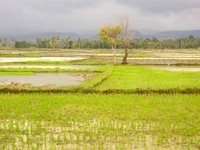 From the very start, I knew most of Aceh would remain unknown to me as anyone who stays only a few days there. So I tried the polsci trick: I read all about its politics, I checked previous student papers that I wrote on Indonesia and Aceh, I kept an eye on the newspapers and tried to use political science as my entry point to a somehat better understanding.
From the very start, I knew most of Aceh would remain unknown to me as anyone who stays only a few days there. So I tried the polsci trick: I read all about its politics, I checked previous student papers that I wrote on Indonesia and Aceh, I kept an eye on the newspapers and tried to use political science as my entry point to a somehat better understanding.
You see, impressions and politics is one and only one posting therefore…
By the t ime I was studying Southeast Asia, it was slowly becoming obvious that East Timor (Timor Leste) was going to separate from Indonesia. One of the most important questions was whether this authoritarian, multi-religious country of thousands of islands and hundreds of languages would unravel or not. Aceh was thought of as the next region to separate if there were such a domino effect. This is what I wrote then:
ime I was studying Southeast Asia, it was slowly becoming obvious that East Timor (Timor Leste) was going to separate from Indonesia. One of the most important questions was whether this authoritarian, multi-religious country of thousands of islands and hundreds of languages would unravel or not. Aceh was thought of as the next region to separate if there were such a domino effect. This is what I wrote then:
“However, Aceh differs from East Timor considerably with its largely Muslim population, and shared colonial history under the Dutch rule, like the rest of Indonesia. The separatist movement in Aceh basis its disagreements with the central government on two critical policies: the ruthless oppression of the military, and the channelling of revenues to Jakarta. Despite its regionalist leader Tengku Hasan M. di Tiro’s struggle against the central rule, it is unlikely that Aceh will separate from Indonesia. Firstly, di Tiro’s influence is declining as he has been away from the country for many years, as well as his age, 72 as of 2002. Moreover, Aceh has experienced a relatively quicker development of infrastructure and welfare compared to East Timor or Iriyan Jaya. It can be argued that the depletion of its LPG resources may necessitate the region to rely on a larger economic entity. Changes in the revenue distribution policies and lessening military pressure (increasing the autonomy of the region) can easily keep Aceh as a part of Indonesia, especially if the decentralisation of centre-region governance structure continues.”
Of course, I couldn’t have guessed the tsunami’s effect. With the tsunami the whole political landscape of Aceh has changed once and for all –let’s hope not until the next disaster…
Wikipedia has some handy information regarding the colonial history of Aceh, but the more recent confrontation is covered by Z-Net (slightly abridged by myself) as of 2002 (for a shorter timeline visit CNN):
“The Indonesian province of Aceh, with a population of around 5 million, is located on the northern-most part of the island of Sumatra, about 1,000 miles from the Indonesian capital Jakarta. Located strategically on the sea lanes between south and east Asia, it became the centre of a powerful trading empire during the 16th and 17th centuries, and one of the earliest Islamic sultanates in southeast Asia.
The people of Aceh have a long history of resistance. For 150 years they thwarted Portuguese and Dutch military efforts to 'pacify' the region and incorporate it in to their colonial empire. After Indonesia's independence in 1945, dissatisfaction with the central government eventually led to the granting of Special Region status, giving the Acehnese control over education, religion and adat (customary) law. However, the decision failed to be implemented. By the mid-1970s after huge natural gas reserves were discovered, blatantly unequal distribution of revenue drawn from the exploitation of these resources contributed to the formation of Gerakan Aceh Merdeka (GAM- Free Aceh Movement) in 1976 and open resistance to central government.
to their colonial empire. After Indonesia's independence in 1945, dissatisfaction with the central government eventually led to the granting of Special Region status, giving the Acehnese control over education, religion and adat (customary) law. However, the decision failed to be implemented. By the mid-1970s after huge natural gas reserves were discovered, blatantly unequal distribution of revenue drawn from the exploitation of these resources contributed to the formation of Gerakan Aceh Merdeka (GAM- Free Aceh Movement) in 1976 and open resistance to central government.
The Suharto regime responded with a campaign of brutality and repression, which reached a peak when Aceh was designated a 'military operations zone' from 1989 until the fall of Suharto in 1998. Thousands of Acehnese men, women and children were killed, tortured or disappeared. After the fall of Suharto, the people of Aceh spoke out publicly for the first time about the years of the terror and brutality, bringing them to national and international attention. Overwhelmed by this torrent of accusations, the head of the armed forces, General Wiranto, announced the end of DOM in August 1998 and apologised for all the abuses. However, neither the governments of Habibie nor Wahid, nor the military, took steps to respond to the demands for justice and compensation by the people of Aceh and no steps have been taken to bring those responsible to trial. During 1999 and 2000, a series of code-named military operations were conducted and there were several massacres in which scores of people were killed.
Exxon/Mobil
Aceh's natural gas has been exploited since 1971 by Mobil Oil, which in 1999 merged with Exxon to become Exxon/Mobil. It operates in partnership with the state oil company, Pertamina, which runs the liquified natural gas plant nearby. The installations are closely guarded by troops who have been responsible over the years for numerous abuses against villagers living in the vicinity of the plant. In June 2001, a lawsuit was filed in the US against the company on behalf of 11 plaintiffs living near the plants.The growth of GAM
Meanwhile, as the Indonesian armed forces became increasingly discredited, the armed resistance, GAM, gained in strength and popularity. Its units now operate in all parts of Aceh and in large swathes of the province it is in effective control of village and local administrations.
Since late 1999, there has been a strong movement in favour of holding a referendum to determined Aceh's future status, as the peaceful way of solving the conflict.
The Negotiations
On the initiative of former president, Abdurrahman Wahid, negotiations were held between the Indonesian Government and GAM, leading to a 'Humanitarian Pause' in June 2000. The armed forces were never happy about this accord and the Pause barely affected the level of killings and the talks have now been suspended indefinitely.
Following a decision by Exxon/Mobil in March 2001 to suspend operations, putting at risk monthly revenues of $100 million and the possible loss of international markets, the armed forces prevailed upon a seriously weakened Wahid to issue a 'presidential instruction' to restore Indonesian administrative control. As pressure mounted for Wahid to be replaced by his vice-president, Megawati Sukarnoputri, the armed forces moved to sabotage what remained of the faltering peace process. During 2001, nearly two thousand people were killed, the vast majority civilians.
The Megawati Presidency
Unlike her predecessor, Megawati fully supported all-out military action to suppress threats to what she prizes above all else, maintaining the Unitary Republic of Indonesia. In late 2001, she ordered the troops 'to hold the country together' regardless of whether this means violating human rights.”
T he tsunami led to a peace agreement between the government of Indonesia and the Free Aceh Movement (GAM), in August 2005. This was to some extent the result of an inflow of international development workers. Before the tsunami, the central government allowed no international visitors to Aceh. On the other hand, the inflow of development aid also had an influence. At the moment, the BBR, a governmental bank, is taking care of the resconstruction in Aceh and managing most of the development aid. In two years all this money will be left to the local government. The agreement between the government and the GAM seems to be around these lines: If the GAM wins the elections and quits its separatist claims the central government would not intervene with the results of the election. (democracy takes weird shapes and forms in the southeast of the globe…)
he tsunami led to a peace agreement between the government of Indonesia and the Free Aceh Movement (GAM), in August 2005. This was to some extent the result of an inflow of international development workers. Before the tsunami, the central government allowed no international visitors to Aceh. On the other hand, the inflow of development aid also had an influence. At the moment, the BBR, a governmental bank, is taking care of the resconstruction in Aceh and managing most of the development aid. In two years all this money will be left to the local government. The agreement between the government and the GAM seems to be around these lines: If the GAM wins the elections and quits its separatist claims the central government would not intervene with the results of the election. (democracy takes weird shapes and forms in the southeast of the globe…)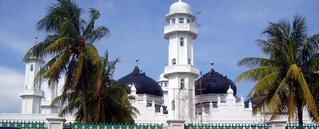
As of December 2006, the peace has held. In 1959 the Indonesian government yielded in part and gave Aceh a "special territory" status, giving it a greater degree of autonomy from the central government in Jakarta than most other regions of Indonesia have. For example, the regional government is empowered to construct a legal system independent of the national government. In 2003, a form of sharia, or Islamic law, was formally introduced in Aceh. In my opinion, this kind of autonomy is not playing into the hands of GAM leaders. Inste ad it is a way of creating power balance between religious leaders and the GAM, who has never demanded sharia law to be implemented, but rather economic reforms that would allow Aceh to utilise its revenues. Nor do the people seem too interested in sharia. The hotel I stayed in was suffocating with rules
ad it is a way of creating power balance between religious leaders and the GAM, who has never demanded sharia law to be implemented, but rather economic reforms that would allow Aceh to utilise its revenues. Nor do the people seem too interested in sharia. The hotel I stayed in was suffocating with rules and norms hanging all over its walls in frames and photocopies, warning against men and women staying together without a marriage document, and it had a general oppressive character that I find very hard to describe but do recognise from a distant past. It was a scary place. Out on the street all Acehnese women and girls (including newly born girl babies) wear headscarves (and every now and then you see some of them taking it out the moment they are in their workplace, or a somewhat more comfortable environment). The clothing and eating rules of sharia doesn’t apply to Indonesians from other regions/religions or to foreigners so these women (myself included) don’t have to wear scarves but long sleeves and trousers. You can even find some beer (see pics), to go with the almost hedonistic food we have had. It was a surprise: I had my best ever Indonesian food in Aceh. It wasn’t primarily Acehnese, as they are more into curry, but the restaurant we have been to almost every night had delicacies ranging f
and norms hanging all over its walls in frames and photocopies, warning against men and women staying together without a marriage document, and it had a general oppressive character that I find very hard to describe but do recognise from a distant past. It was a scary place. Out on the street all Acehnese women and girls (including newly born girl babies) wear headscarves (and every now and then you see some of them taking it out the moment they are in their workplace, or a somewhat more comfortable environment). The clothing and eating rules of sharia doesn’t apply to Indonesians from other regions/religions or to foreigners so these women (myself included) don’t have to wear scarves but long sleeves and trousers. You can even find some beer (see pics), to go with the almost hedonistic food we have had. It was a surprise: I had my best ever Indonesian food in Aceh. It wasn’t primarily Acehnese, as they are more into curry, but the restaurant we have been to almost every night had delicacies ranging f rom sea cucumbers to wild looking whole fish and sea urchins and all sorts of weird vegetables that can hardly recall any further. Even tofu tasted great! The restaurant owner was the creator of this variety and told us what he experimented recently. I missed the usual fruit platte
rom sea cucumbers to wild looking whole fish and sea urchins and all sorts of weird vegetables that can hardly recall any further. Even tofu tasted great! The restaurant owner was the creator of this variety and told us what he experimented recently. I missed the usual fruit platte rs I got so used to nevertheless... This was one of the restaurants that served beer, and without any disturbance either. I mean, you didn’t feel bad drinking it, which is quite important. There were other places, too and I appreciate the flexibility people had. As a result even when dressed differently and not sharing their views on alcohol you don’t see a disturbing look in anyone’s face (when this happens, especially with women, I find it very appalling and hard to bear). So the election results were not a landslide towards more religious parties: the GAM won big time.
rs I got so used to nevertheless... This was one of the restaurants that served beer, and without any disturbance either. I mean, you didn’t feel bad drinking it, which is quite important. There were other places, too and I appreciate the flexibility people had. As a result even when dressed differently and not sharing their views on alcohol you don’t see a disturbing look in anyone’s face (when this happens, especially with women, I find it very appalling and hard to bear). So the election results were not a landslide towards more religious parties: the GAM won big time.
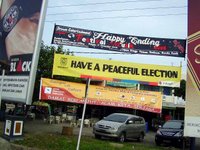 So, I was there right after the first democratic local ele
So, I was there right after the first democratic local ele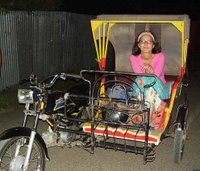 ctions of Aceh took place. The military was constantly passing comments on the media that Aceh was a part of Indonesia and it’d better remain so. The government was agreeing, and highlighting the ultra-democratic stance that they were taking regarding the election results. The Indonesians that I spoke to after I was out of Aceh were mostly playing the results down, saying that this population is so confused that “they simply want to try something new by electing the GAM.” I can understand that the oppression hasn’t only come from the central government in the last decades but also from a movement that required a lot of cash flow. Yet, I don’t think the people vote for the GAM out of hopelessness or ignorance. I would expect the village heads or traditional leaders having an influence on the voters and I would expect GAM to have impressed them in one way or the
ctions of Aceh took place. The military was constantly passing comments on the media that Aceh was a part of Indonesia and it’d better remain so. The government was agreeing, and highlighting the ultra-democratic stance that they were taking regarding the election results. The Indonesians that I spoke to after I was out of Aceh were mostly playing the results down, saying that this population is so confused that “they simply want to try something new by electing the GAM.” I can understand that the oppression hasn’t only come from the central government in the last decades but also from a movement that required a lot of cash flow. Yet, I don’t think the people vote for the GAM out of hopelessness or ignorance. I would expect the village heads or traditional leaders having an influence on the voters and I would expect GAM to have impressed them in one way or the  other. Patronage never dies…
other. Patronage never dies…
Let’s hope peace prevails… It’s a scary thing if the interests of big corporations are secured before the political stability, and that has been my worry in Aceh. Not only Exxon. The coffee corporations buy the world’s top quality coffee beans from Aceh (and it tastes too good to be true). They have the plantations restored and try to create ways to ensure constant high quality harvests. I would rather drink it the Acehnese way rather than the Starbucks and Nescafe versions. It was therefore very surprising not to be able to find any of it out of Aceh, in our next stops such as Kumai, Kalimantan, or Lombok but Nescafe in little plastic bags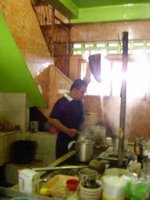 was available everywhere (literally!). The coffee shop was my last stop before the airport, and it’s a pity I bought only a few packs of Takengon coffee and not the whole of the stock ;) They made it in perverse looking filters (see pics) yet it was absolutely sobering and it was the best last stop I could imagine before taking off to Java to meet Harro and his mysterious gang and take a flight to Kalimantan to the Orang Utan Forests...
was available everywhere (literally!). The coffee shop was my last stop before the airport, and it’s a pity I bought only a few packs of Takengon coffee and not the whole of the stock ;) They made it in perverse looking filters (see pics) yet it was absolutely sobering and it was the best last stop I could imagine before taking off to Java to meet Harro and his mysterious gang and take a flight to Kalimantan to the Orang Utan Forests...
2 comments:
Very impressive piece you wrote. Lots of information, but relevant information. I hope for Aceh and its population that peace will indeed prevail. And hope for you that you will drink the finest coffee again.
You really wanted to get to the Kalimantan part, no? Anwyways, I think you gave Aceh (at least some of) the attention that it deserves. I look forward to meeting this 'mysterious gang'(how Scooby Doo-ish!) in the next post!
Post a Comment